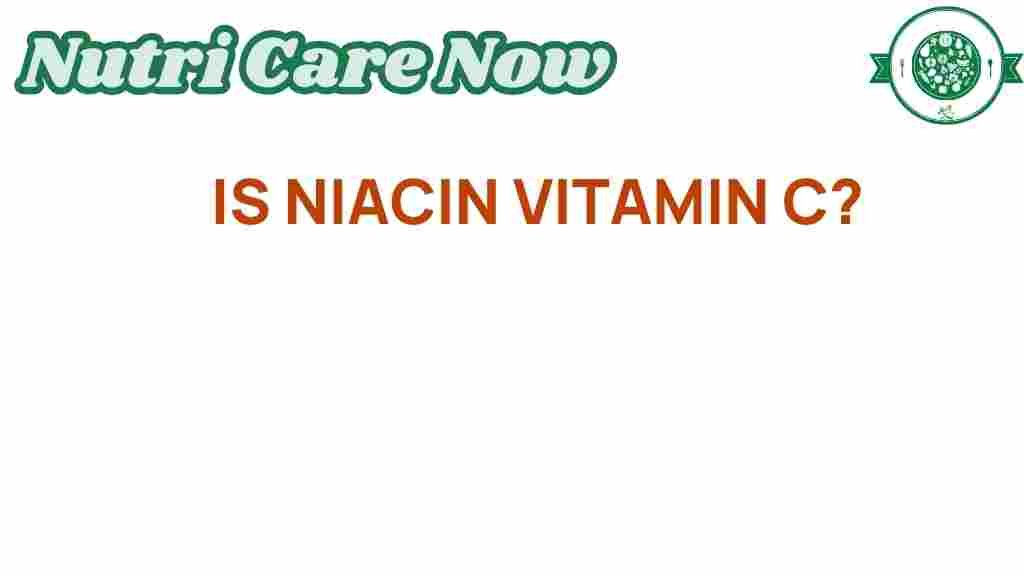Is Niacin the Secret Vitamin C Alternative You’re Missing?
When it comes to health benefits, many people instinctively think of vitamin C as a go-to for immune support. However, there is another vitamin that may be an equally powerful contender: niacin, also known as vitamin B3. This article dives deep into the world of niacin, exploring its health benefits, how it compares to vitamin C, and its role in nutrition and dietary choices.
Understanding Niacin and Vitamin C
Niacin and vitamin C are both essential nutrients that play crucial roles in maintaining our health. While vitamin C is well-known for its antioxidant properties and support for the immune system, niacin also offers a range of health benefits that are often overlooked.
- Niacin (Vitamin B3): An essential nutrient that helps convert food into energy, supports brain function, and improves cholesterol levels.
- Vitamin C: A powerful antioxidant that protects cells, supports collagen production, and boosts the immune system.
Both vitamins are vital for our overall health, but they serve different purposes in our body. Understanding these differences can help you make informed dietary choices and possibly integrate niacin into your supplement routine.
The Health Benefits of Niacin
Niacin is often recognized for its ability to improve cholesterol levels, but its health benefits extend far beyond that. Here are some key health benefits of niacin:
- Cholesterol Management: Niacin has been shown to increase HDL (good cholesterol) levels and lower LDL (bad cholesterol) levels, making it beneficial for cardiovascular health.
- Energy Production: Niacin plays a crucial role in converting carbohydrates, fats, and proteins into energy, helping your body function efficiently.
- Skin Health: Niacin may help improve skin barrier function and reduce the signs of aging.
- Brain Function: Adequate niacin levels are associated with improved cognitive function and a lower risk of neurodegenerative diseases.
- Immune Support: Niacin contributes to a healthy immune system by supporting cellular health and promoting the production of immune cells.
How Does Niacin Compare to Vitamin C?
While both niacin and vitamin C are important for health, they work in different ways. Here are some comparisons:
- Antioxidant Properties: Vitamin C is a well-known antioxidant, while niacin plays a supportive role in cellular metabolism but is not a direct antioxidant.
- Immune Function: Vitamin C is often the first choice for immune support, but niacin also contributes to immune health through its role in energy metabolism.
- Sources: Vitamin C is primarily found in fruits and vegetables, while niacin can be obtained from meat, fish, and whole grains.
Dietary Choices for Optimal Niacin Intake
Incorporating niacin into your diet is essential for reaping its health benefits. Here are some dietary choices that can help you boost your niacin intake:
- Meat: Chicken, turkey, and beef are excellent sources of niacin.
- Fish: Tuna and salmon are rich in niacin.
- Whole Grains: Brown rice, barley, and whole wheat products contain niacin.
- Legumes: Beans and lentils offer a good amount of niacin.
- Nuts and Seeds: Peanuts and sunflower seeds are also great sources.
To further explore dietary choices that enhance your nutrition, consider visiting this resource for tips on meal planning.
Niacin Supplements: Should You Consider Them?
For those who may not get enough niacin through dietary choices, supplements are available. Here’s a step-by-step process for considering niacin supplementation:
- Assess Your Diet: Determine if you are getting sufficient niacin through your daily meals.
- Consult a Healthcare Professional: Before starting any new supplement, it’s essential to talk to a doctor or nutritionist, especially if you have underlying health conditions.
- Select Quality Supplements: If you choose to supplement, look for high-quality niacin supplements from reputable brands.
- Monitor Your Intake: Pay attention to how your body responds and adjust your intake as needed, under professional guidance.
Potential Side Effects and Troubleshooting Tips
While niacin is generally safe when taken in appropriate amounts, excessive intake can lead to side effects, including flushing, nausea, and liver toxicity. Here are some troubleshooting tips:
- Start with Low Doses: If you are new to niacin supplementation, start with a lower dose to see how your body reacts.
- Take with Food: Consuming niacin with meals can minimize gastrointestinal discomfort.
- Stay Hydrated: Drink plenty of water to help your body process the supplement.
- Monitor Symptoms: Keep track of any side effects and consult a healthcare professional if you experience adverse reactions.
Conclusion: Embracing Niacin for Health and Wellness
In conclusion, while vitamin C is a well-established nutrient for immune support and overall health, niacin also offers significant health benefits that should not be overlooked. From improving cholesterol levels to supporting brain function, niacin is a valuable addition to anyone’s nutrition regimen. By making informed dietary choices and considering supplementation when necessary, you can enhance your health and well-being.
So, the next time you think about vitamins for immune support and overall health, remember that niacin may just be the secret alternative you’re missing in your dietary choices. Embrace the power of niacin and unlock its potential benefits for a healthier life.
For more information on vitamins and their benefits, check out this external resource.
This article is in the category Supplements and created by NutriCareNow Team
